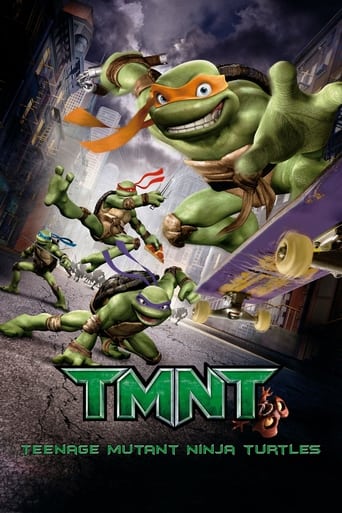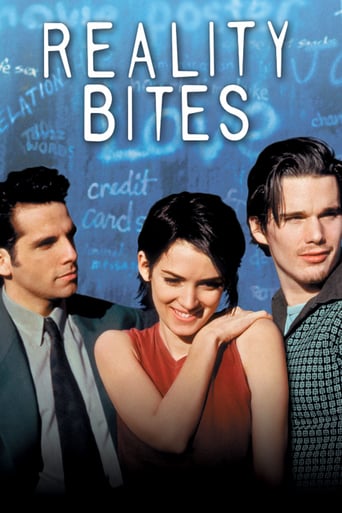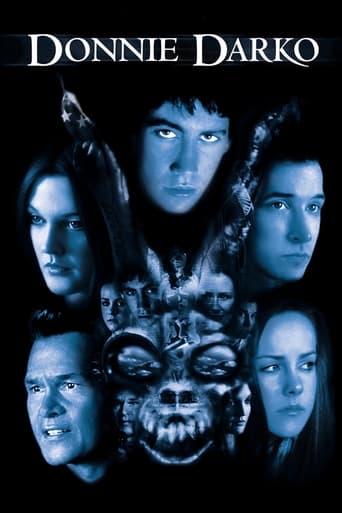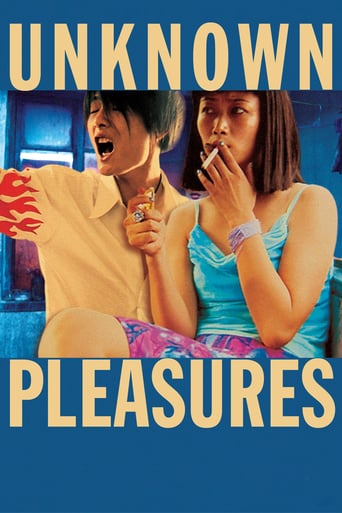
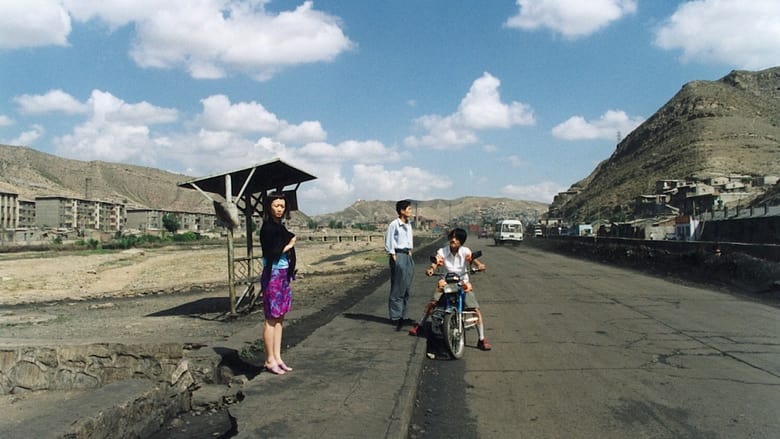
Unknown Pleasures (2002)
Three disaffected youths live in Datong in 2001, part of the new "Birth Control" generation. Fed on a steady diet of popular culture, both Western and Chinese, the characters of Unknown Pleasures represent a new breed in the People's Republic of China, one detached from reality through the screen of media and the internet.
Watch Trailer
Cast


Similar titles
Reviews
Unknown Pleasures is arguably one of director Jia Zhangke's finest works, more raw yet subtle than his later, bigger titles. Shot on a simple hand-held system, the low-fidelity image hits us in the face with the dirty and dusty 'real' China, one in which the bare walls of prefab concrete slabs are covered in brown stains in a way that his more recent and better-funded work, A Touch of Sin (2013), can't.As we can read in most other reviews of this film, alienation in the social and economical sense are a key feature in the protagonists' lives. Our two heroes, Xiao Ji and Bin Bin, try to navigate life on the bottom rungs of Chinese society along with the relationships with the women in their lives. They end up doing perhaps the worst heist attempt in the history of cinema. Not a story of the kinds we've never seen before, but where Jia Zhangke excels is telling this story, creating a setting that feels so real that the awkward lives of our heroes are understandable to us, the viewer from a different world. He does that through superb camera and sound direction. The camera is static during most dialogs, confined to the narrow concrete-walled rooms of provincial China. It only moves and pans when it needs to, which is when the character in focus moves, and it only cuts when it needs to. It's very economical in the same way that the Chinese people in these kinds of cities live; having just enough money to live, saving most of their earnings like Bin Bin's mother or just getting by day by day like Bin Bin himself. All the sounds and music in Unknown Pleasures come only from the world in which the scenes take place: the clapping and cheers from audiences, the crying sounds of cheap Chinese opera, background TV chatter, night crowds on the street, the horns and humming cars and other traffic, the advertising jingles and announcements. Where the camera work allows us to focus on the characters, the sound places the viewer inside China, whether it's Datong in 2002 or a third-tier city in 2015. What Jia Zhangke showed me is a China as I remember living it: the same faces, the same clothes, the same environment and sounds. Just as him, I was always living it with a detached lens of an outsider, someone studying these people with a somewhat objective curiosity, with no understanding of their daily lives and feelings. Our ignorant heroes find themselves in circumstances beyond their control, brought upon by their ever-changing social and physical environment.This is of course nothing new as we all know about the conditions of the poor in developing countries, but we need to see the human faces in order to make sense of it. Bin Bin and Xiao Ji may be young, desperate and stupid, and barely able to express themselves in words, but we can understand them. Bin Bin finds himself unable to join the army due to testing positive for hepatitis, a disease entirely preventable with vaccination but still very common in China. He takes to selling bootleg discs, while Qiao Qiao goes back to prostitution even after Xiao San is killed off screen. Being young, desperate and stupid, the two boys settle on a pathetic attempt to rob a bank with a fake bomb made out of cardboard. Bin Bin finds out, after his arrest, that robbery carries the death penalty in China. In the films conclusion, a cop makes him sing "Unknown Pleasures" (Ren Xiao Yao), a pop song based on ancient Chinese philosophy by Zhuangzi, who is quoted by Qiao Qiao and interpreted (wrongly) to mean that they "are free to do anything they like". This misunderstanding is part of their experienced alienation from traditional Chinese culture as well as the contemporary culture which is no longer isolated from the rest of the world. After all, American culture, or better to say pop culture, is omnipresent. These Chinese may live in a backwater town, but they are not wholly ignorant of the world at large. They value the position of their country in the world - outside of the club, the live broadcast of the announcement of Beijing as podium of the Olympic Games in 2008 results in loud celebration from the local men crowded around the one present TV set - and at a same time are aware of rising rivalry with the USA. This is a very crucial part of national identity and globalization: an understanding of where one stands in the 'global hierarchy' of nations. At the same time, misconceptions exist too. Is a dollar bill really worth a thousand Yuans? Is it really as easy to pull off a robbery as in Pulp Fiction? The underlying question is the same: how different, or how much better, would their lives be if they were born in America? Zhangke uses the television screen, specifically the news broadcasts, to relay this sense of Chinese identity in the world to the viewer. The news media give us an even more detached look at the world than the filmmaker's, yet is so important to how millions of people view their position in the world.At his turn, with Unknown Pleasures the director gives us an insight into the alienated youth of a rapidly changing country, into the life of the near-bottom feeders of society, into their relationships and their sense (or lack) of identity, without the production and flash of his later films.
I greatly enjoy most Chinese films not to mention films in general. This film I just don't get. I fell asleep the first time I tried to watch it. I resumed watching the next day at the point I last remembered seeing. When the end unexpectedly reared its ugly head, I wished that all the characters (vs the actors of course) had died in the movie and put us all out of our misery. These characters had nothing about them to get me interested in them as characters or in their story. They were pure and simple... bored and very boring. Other than a little eye candy in the form of the female lead (who was nonetheless also without any real interest), I saw nothing worth spending the two hours I did with this film. If you have absolutely no inner resources, perhaps you will identify with these characters. Otherwise I'd run when you see the DVD cover.
Jia Zhang-ke's movie is powerful and sad. It concerns what you might call two young semi-urban hicks with no future, both rail-thin, constantly smoking, one Bin Bin (Zhao Wei Wei), tall and sad-faced, the other, Xiao Ji (Wu Qiong), a smaller guy with a stylish haircut that covers a lot of his face. The former has a girlfriend, but he and she agree to separate while she goes through exams. Then she reproaches him for not asking how she did, but he protests that he's out of the loop so didn't know when she was done. His mother, a Falun Gong sympathizer, says he's useless and he offers to enter the army. But when he has a blood test, it shows he has hepatitis and he's ineligible for military service. The orderly warns him about contact with a girl because it's very contagious. It seems like his life is over.Neither guy has a job and they have no money. Xiao Ji, the smaller, more rakish one, who is all bravado and no follow-through, practically stalks a girl named Qiao Qiao (Zhao Tao) who's an entertainer for a drink company and who has a petty gangster for a boyfriend. This older punk eventually has Xiao roughed up at a disco for dancing with his girlfriend, and turns out to carry a gun. The girl at first rejects the boy, but then they go together and even sleep together.After he learns he has hepatitis Bin Bin borrows money from a shyster and gives his girlfriend an expensive present in a very sad scene where he won't touch her and she leaves him sitting by himself inertly in a typically desolate train station.Both the pals have dead-end lives. Sometimes the Chinese landscape, a vast rural-turning-into-urban wasteland under construction, reminds one of Italian neo-realism and the poverty of postwar European cities and one may be reminded of Pasolini's 1961 first film about young toughs with nothing to do, Accattone, but these Chinese boys are more passive and inarticulate and lack the Italians' false bravado.Bin Bin starts selling discs to make back the money he owes but that looks hopeless and Xiao Ji's motorbike is starting to break down. Finally they decide to rob a bank. Naturally such a demanding project undertaken by two individuals of such low energy and flair is a complete flop, and the tall boy is arrested while the punk-haired one flees on the bike, but he has to leave it by the side of a desolate highway and hitch a ride in a van.Bin Bin, in jail, is forced to sing a song and he sings a hopeful song about working class people he sang with his girlfriend in front of the TV at a happier moment. The film ends here, with the voice-over of the boy and girlfriend singing over the final credits.The ironically named "Unknown Pleasures" is an infinitely sad, unpredictable, seemingly aimless, but ultimately very meaningful and awesome movie that is at once primitive, real, and deeply touching. This is a great movie. It takes you somewhere you've never been before, somewhere painful and unforgettable. You can say this is a "depiction of the spiritual malaise afflicting Chinese youth as a result of global capitalism" as Howard Schumann has done, but that is to articulate the thing in a way that the participants in the story could not do. Rather, it is a couple of aimless lives awash in a changing modern China pretty near to the bottom of the social scale; but it is also a picture of lack of chutzpah, helplessness, failure to thrive. TV's, always on in some room, show events in and out of China, new construction, criminal prosecutions, a downed US plane, Beijing chosen for the Olympics, and there is talk of dollars and video games and even Pulp Fiction's opening scene, but all this is little more than a noisy distraction for the aimless boys. The young people in Hou Hsiao Hsien's 2001 Millennium Mambo are rather different. They are all good looking hustlers, and they may go nowhere either but they're going to make some kind of splash and spend some money along the way. But while Hou's film seems on the outside looking in cluelessly, Jia enters to the core of his characters' grim shallow lives and etches them on our hearts forever. Jia creeps up on you slowly and then never lets you go. This is the most powerful film I've seen in a long while. Its contents seem trashy and junky, but turn out to be astonishingly vivid and rich visually and aurally, a mix, also, that you've never quite seen before and aren't going to forget even if you want to.Perhaps Jia is the most talented of the "edgy underground film movement" that is the "Sixth Generation" of Chinese filmmakers, but not all his work is the same. "Platform "has more sweep and is more personal; "The World" is more up-to-date and relevant; but this is the one that grabbed me and showed me Jia's raw greatness as a filmmaker. It has more drive and more emotional power than anything else he has done so far.
I'm confused as to why people would still give the pleasant peasant fables of Zhang Yimou house-room now we're offered a view of intense, complex, and contemporary Chinese cinema like this. I adored the extreme negativity of this film's most repetitive moments: Xiao Ji getting slapped about the face ("having a good time?" "yes" "having a good time?" "yes" "having a good time?" "yes" "having a good time?" "yes"...) or trying repeatedly to drive up a slight slope on his motorbike. The very repeatability of film seems to highlight the way that only this silly, essentially boring medium gets at what's going on when stuff happens, in capitalist China as well as at home...






